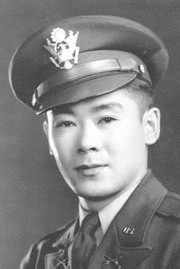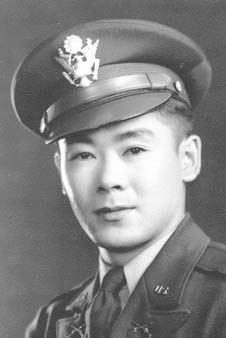
Banco de Dados da Experiência Militar Nipo-Americana

Dye Ogata
37th Infantry Div; USAFISPA; S-20 (Canadian Army)
Pacific Military Intelligence Research Section, Camp Ritchie, MD
Central Intelligence Group, Washington, DC; CIC
Infantry platoon leader
Language officer.
Other Countries: South Pacific; Canada
Interrogate POWs
Translate enemy documents
Teach Japanese.
Combat Infantryman's Badge - 1944
Commendation of Canadian Department of National Defence, S-20
American Theater Ribbon
Good Conduct Medal
Asiatic Pacific Theater Ribbon w/1 Star
World War II Victory Medal
Presidential Unit Citation as member of MIS
The CITATION reads as follows:
By virtue of the authority vested in me as President of the United States and Commander-in-Chief of the Armed Forces of the United States, I have today awarded
THE PRESIDENTIAL UNIT CITATION(ARMY)FOR EXTRAORDINARY HEROISM TO THE MILITARY INTELLIGENCE SERVICE, UNITED STATES ARMY
The Military Intelligence Service is cited for outstanding and gallant performance of duty in action against enemies of the United States from 1 May 1942 to 2 September 1945. The Military Intelligence Service provided superior intelligence collection and dissemination services during World War II to combat forces throughout the world; its members were interpreters, translators, interrogators, propaganda specialists, and signal technicians who worked in every echelon of the United States military establishment and with Allied Forces. The Military Intelligence Service participated in every major battle and campaign in the Asiatic-Pacific Theater of Operations and served in intelligence roles in the United States and in the European Theater of Operations. The more than six thousand linguists were assigned to combat units on every front, primarily in the Pacific Theater, supporting these units with critical interpretation, translation, radio reception, and interrogation services. The Military Intelligence Service not only played key roles in battlefield situations, they also provided United States forces with an unprecedented amount of intimate, authoritative, detailed, and timely information on enemy forces to support planning and execution of combat operations. The key contributions made by the members of the Military Intelligence Service in providing valuable intelligence on military targets helped advance the United States and Allied cause during World War II and undoubtedly saved countless lives and hastened the end of the war. The significant achievements accomplished by the faithful and dedicated service of the linguistic-intelligence specialist graduates of the Military Intelligenc Service Language School, who formed the Military Intelligence Service will never be forgotten by our grateful Nation,. Their unconquerable spirit and gallant deeds under fire in the face of superior odds, and the self-sacrificing devotion to duty are worthy of the higheset emulation.
Bathing was field facilities.
Food was field kitchen.
Entertainment was outdoor movies.
Wars in Asia from Pearl Harbor to Vietnam could have possibly been avoided if U.S.A. had been magnanimous enough to allow Asians in their midst where national decision authority was concerned.
Sgt Dye Ogata's Army active service, from 1942-1948, is detailed in a written account which is available for review by asking the librarian.


